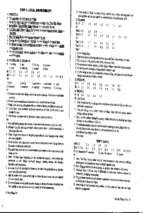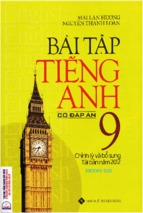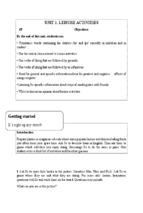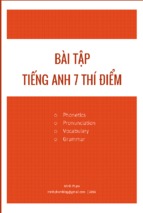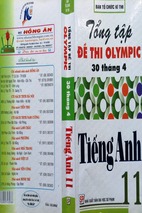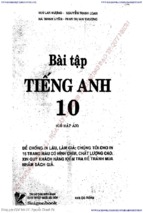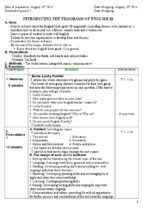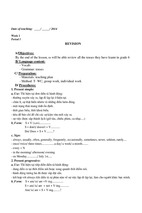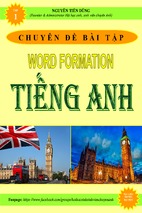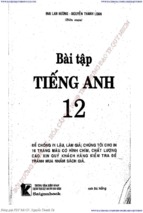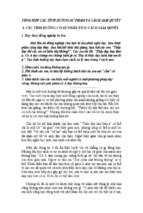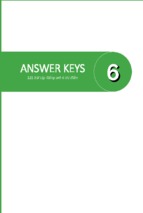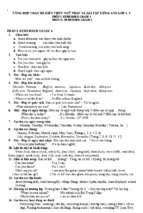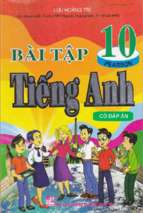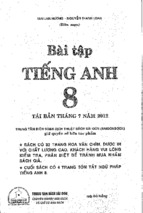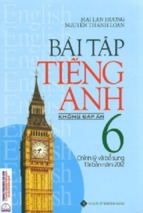English for Business
Management
Chapter I: Economics
Unit 1: Economic Activity
Text 1.1
Most people work in order to earn their
living. They produce goods and services.
Goods are either produced on farms, like maize and milk, or
in factories, like cars and paper.
Services are provided by such things as schools,
hospitals and shops.
Some people provide goods; some provide services.
Other people provide both goods and services.
For example, in the same garage, a man may buy a car, or
he may buy some service which helps him to maintain his car.
The work which people do is called their economic activity.
Economic activities make up the economic system.
The economic system is the sumtotal of what people do and
what they want.
The work which people undertake either provides what they
need or provides them with money.
People buy essential commodities with money.
Exercise 1
Answer the following questions:
1. Why do most people work?
2. What do they produce?
3. Where are goods produced?
4. What do schools, hospitals and shops provide?
1
English for Business
Management
5. What two different things can a man buy in, for example,
a garage?
6. What do we call the work which people do?
7. What is an economic system the sumtotal of?
8. What two things can work provide for the worker?
Exercise 2
Change these sentences in the same way as the example.
Both sentences refer to future possibilities.
Example: Perhaps he will come.
He may come.
1. Perhaps he will buy a car.
2. Perhaps we shall want some more fruit tomorrow.
3. Perhaps they will get the essential commodities soon.
4. Perhaps the service will stop next month.
5. Perhaps the garage will not sell that car to him.
6. Perhaps the economic system belongs to a city, a whole
country or the whole world.
7. Perhaps the car does not belong to those people.
8. Perhaps he will buy some service which will help him
maintain his car.
9. Perhaps he will see the car when he comes tomorrow.
10. Perhaps he will provide what they need when he comes.
Language practice
1. Relative pronouns
Relative pronouns do two jobs at once. They are used as
the
subjects
or
objects
of
verbs,
like
other
pronouns; at the
same time, they
join
clauses
together,
like conjunction.
2
English for Business
Management
Example: What’s the name of the blond girl? She
just came in.
What’s the name of the blond girl who just came
in?
The most common relative pronouns are who, whom, which
and that. Who and whom are used for people; which are
used for things.
Example: I don’t like people who lose their tempers
easily.
Mexico city, which has a population of over 10 million,
is probably the fastest growing city in the world.
Whom (which refers to the object of a verb or a
preposition)
is
rather
unusual,
especially
in
conversational English. It is generally either left out,
or replaced by who or that. It is almost impossible in
clauses that end with a preposition.
Example: Do you think one should stay faithful to the
person to whom one is married?
That
whom
can
often
(but
not
or which,
who.
and
quite
E.g. The
excites
trumpet
always)
often
is
be
instead
the
used instead
of
of
instrument
that
really
me.
She is the only person that understands
me.
After nouns referring to times and places, when and
where can be used to mean at which or in which.
After the word reason, why is used to mean for which.
Example: Can you
convenient to meet?
suggest
Is there any reason why
you
a
time when it will be
I know a wood where you
can
3
English for Business
Management
should have a holiday?
find wild strawberries.
Whose is a possessive relative word.
4
Example: This is Henry, whose wife works for my brother
inlaw.
Exercise 1
Combine these pairs of sentences as in the example:
Example: The
services.
services
are
useful.
The
workers
provide
The services which the workers provide are useful.
a. The goods are essential. They need the goods.
b. The schools and hospitals are essential. They
provide schools and hospitals.
c. The goods are valuable. He buys the goods.
d. The money buys essential commodities. People can
earn this money.
e. The goods and services are very useful. People
produce these goods and services.
f. The work is called economic activity. We do this work.
g. The work provides them with money. People do this work.
h. The economic activities make up the economic system.
People undertake these economic
activities.
2. Change nouns into adjectives
Exercise 2
In these sentences, certain nouns are printed in
italics. Change
them
into
adjectives
can
be
used
in
the
blanks.
Example: education
education +
al
educational
Commerce
commerci + al
which
commercial
a. These goods belong to the nation. They are therefore
_national
.
b. Minerals are
a
natural
.
part
of
nature.
They
are
therefore
c. Schools provide education. They are therefore centers of
educational
activity.
d. Shops are places of commerce. They are therefore centers
of
e. He
commercial
does
not
want
activity.
anyone
wants to
do
the work
is his _personal
else
to
do
this
work.
He
in person. It
concern.
Text 1.2
Most people work to earn a living, and produce goods and
services. Goods are either agricultural (like maize and
milk) or
manufactured
(like
carsand
paper).
Services
are
such things
as education,
medicine
and
commerce. Some people provide goods;
some provide services. Other people provide both goods and
services. For example, in the same garage a man may buy a
car or some service which helps him to maintain his car.
The
work
which
people
do
is
called
economic
activity. All economic activities together make up the
economic system of a town, a city, a country or the world.
Such an economic system is the sumtotal of what people do
and what people want. The work people undertake either
provides what people need or provides the money with which
they can buy essential commodities. Of course, most people
hope to earn enough money
to buy commodities and services which are nonessential but
which provide some particular personal satisfaction, like
toys for children, visits to the cinema.
Exercise 1
Decide whether the following statements
false
(F), and if they are false say
why.
1. Most
services.
people
produce
either
are
goods
(T)
or
or
2.
Services
are
either
agricultural
manufactured.
3. Education and medicine are provided by
hospitals.
4. Cars and paper are agricultural
goods.
5. Paper is non agricultural commodity.
6. The work which people do is called
system.
true
an
or
schools
and
economic
7. A city has its own economic
system.
8. Economic activity is the sumtotal of what people do and
want.
9. The work people undertake provides them with money, or
with what they need.
10.
Most people do not
commodities and services.
want
to
buy
nonessential
Exercise 2
In the sentences below replace which with that. When you
have done this, rewrite all the sentences without either
which or that. The meaning remains the same but
sentences become less formal.
1. The goods which they wanted were essential
minerals.
the
2. The schools and hospitals which they
essential.
3. The goods which he buys are valuable.
provide
are
4. The money which the people earned bought many commodities.
5. The goods and services which people produce are very
useful.
6. The work which we all do is called economic activity.
7. The work which most people do provides them with money.
8. The economic activities which people undertake make up
the economic system of a town, city, country or larger
area.
9. The economic system which people belong to is the sum
total of their needs and actions.
10. The work which he undertook
was
essential.
Study the words
Earn one’s living
Maintain (v)
Make up (v)
Sumtotal (n)
Undertake (v)
Essential (adj)
Commodity (n)
useful
but
non
Unit 2: Different economic systems
Text 2.1
Not all economic systems are the same.
The economic system of the United States is very
different from the economic system of the USSR. The American
system is based on private enterprise. The Russian system is
based on the principle of Karl Marx. Karl Marx is a
political economist who lived in the 19th
century. The
American system is capitalistic, while the Russian system is
communistic.
The economic ideologies of these two nations differ very
much from each other. The economic system of Britain is
similar to the American system. Britain has the economic
system based on private enterprise and private supplies of
capitals. Property in Britain and the United States can be
owned by individual citizens.
The
economic
freedom
of
the citizens of
Britain
and America
is
not
complete freedom. Citizens must obey the law, but
otherwise they can use their time, money and effort as they
wish.
Exercise 1
Answer these questions, basing your answers on the text.
1. What does the economic system of the United States
differ from?
2. What is the American system based
on?
3. What is the Russian system based
on?
4. When did Karl Marx
live?
5. What economic system is the British system similar
to?
6. On what two things is the British system
based?
7. Who can own property in the United States
Britain?
and
8. What must British and American citizens
obey?
9. What three things can Britons and Americans use as
they wish?
Exercise 2
Make these
example
Example:
services.
sentences
Most
people
passive,
produce
as
in
goods
the
and
Goods and services are produced by most people.
1. Some people provide both goods
services.
2.
Economists
study
the
economic
system.
3.
That
house.
4.
They
clothes.
man
owns
will
5.
Economic
lives.
the
provide
changes
shelter
affect
our
and
and
6. They will maintain his car.
7. The economists explained the economic system.
8. They explained the methods.
9. He told me how the Russian system works.
Exercise 3
Here are two lists. The first list contains adjectives.
The second list contains nouns and noun phrases. Arrange the
words in each list so that the adjectives match the nouns in
ways which relate to the text. The first two are done
for you.
Capitalistic
Economic
Private
Communistic
Political
Scientific
Basic
Complex
Essential
satisfaction
Russian system
necessities
enterprise
commodities
methods
American system
economist
ideologies
Personal
range
Language practice
1. Description: the use of active and passive
Look at these two sentences:
A.
International
traffic
is
carried
by
the
Transit
Network.
10
B.
The
traffic.
Transit
Network
carries
international
Both A and B are correct. The choice (A or B) depends on
what you want to emphasise: “International traffic”
(sentence A) or “The Transit Network” (sentence B).
Now
look
sentences:
at
these
two
C. The economic system was based on Marx by
them. D. They based the economic system on Marx.
C is much better than D. The personal subject “they” does
not add any information. In fact, it makes the important
information more difficult to see.
Exercise 1
Make these sentences passive and omit the agent phrase in
the same way as in the example.
Example: They based the economic system on Marx.
The economic system was based on Marx by
them. The economic system was based on Marx.
a. They provided all necessary goods and
services.
b.
He
will
supply
all
the
essential
commodities.
c. The farmer undertook the work last week, and has
just finished it.
d. The men satisfied the economist that they would do
the
work rapidly.
e. The economist described the whole economic system in
a strictly scientific way.
f. The economic system affected the people’s lives in
many
11
ways.
12
g. They studied
the
supply
of
both
essential and
non
essential commodities.
h. The people enjoy a strong economy in that country.
i. The citizens exercise a
freedom.
j. They must obey the law.
2. Word formation
considerable amount economic
Suffixes
When you are reading, you will come across unfamiliar
words. It is often possible to guess the meanings of these
words if you understand the way words in English are
generally formed.
Affixes
Prefixes
+
stem
+
suffixes
An English word can be divided into three parts: a
prefix, a stem and a suffix. Pre means “before”; a prefix,
therefore, is what comes before the stem. Consider, as an
example, the prefix DE (meaning “reduce” or “reserve”) in a
word like demagnetize (meaning “to deprive of magnetism”. A
suffix is what is attached to the end of the stem. Consider,
as an example, the suffix, ER (meaning “someone who”) in
programmer (“the person who programs”). Both prefixes and
suffixes are referred to as affixes.
Prefixes usually change the meaning of the word, for
example, un changes the word to a negative. Unmagnetizable
means “not able of being magnetised”. Suffixes, on the
other
13
hand, change the word from
For example, ly added to
adverb quickly.
Let
and their
one part of speech to another.
the adjective quick gives the
now
consider some suffixes
usual meanings.
Suffixes
Nouns
ance
verbs
ize
adjectives
able
or
er
ate
ify
ible
less
ist
ness
en
ic
Adverbs
ly
cal
ism
ence
ish
ive
Exercise 2
Form new words from the words listed below.
Example: capital
capitalism
Note: The suffixes ism
ist
capitalist
capitalistic
= system (noun)
= person (noun)
istic = about the system or person
(adjective).
14
a.
commune
b. social
c. national
d. real
e. individual
Text 2.2
Not all economic systems are the same. The economic
system of the USA differs greatly from the system of
the USSR. The American system is based on private enterprise
with private ownershipof
the means of
production, while the Russian
system is
communistic and
is based upon
the
principles
of Karl
Marx, the
19th
economist. The economic ideologies of
contrast very strongly.
century political
these two nations
Britain is similar to the USA. It has an economic
system based on private enterprise and private supplies of
capital, which can
be defined as surplus income
availablefor investment in new business activities.
Property in both USA and Britain can be owned by individual
citizens and these citizens exercise considerable
economic freedom of choice. They can choose what
they want to do and how they want to earn their living,
but are not of course entirely free to do as they wish.
They must obey the law. Otherwise, however, they can use
15
their time, money and effort as they wish.
16
Exercise 1
Decide whether the following statements are true (T) or false
(F), and if they are false say why.
1. The economic systems of the USA and USSR are the same.
2. In the USA the means of production are privately owned.
3. Karl Marx was an eighteenth century economic thinker.
4. The British system is based on the principles of Karl
Marx.
5. Because British has a system of private enterprise, we
can say that its economy is similar to the American
economy.
6. Capital is essentially surplus income used for business
activities.
7. Individual citizens in Britain and the United States
have complete economic freedom.
8. British citizens can choose what they want to do as
long
as they obey the law.
Exercise 2
1. Find single words in the first paragraph of the text
for which these words could be substituted.
a. founded b. possession
countries
c. main teaching
d.
2. Find single words in the second paragraph of the text
for which these words could be substituted.
a. stores
single
b. described
c. extra
e. have and use
h. completely
f. selection
g. pick
i. follow
j. physical power
d.
17
- Xem thêm -


